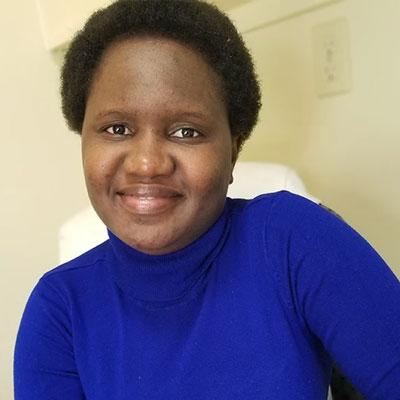Student Stories: Dr. Busayo Kodaolu
Published: August 28, 2025
PhD Graduate and Research Associate at Agri-food Data Canada
The Ontario Agri-Food Innovation Alliance and Agri-Food Data Canada come together to train the next generation of agri-food data leaders, building interdisciplinary expertise critical for the province’s agri-food sector.

Dr. Busayo Kodaolu has learned how to leverage modern technology while making agri-food research data more accessible to future scientists.
The research associate at Agri-Food Data Canada (ADC), based at the University of Guelph, is applying programming and data analysis skills to improve an application that extracts and visualizes agri-food research data. Researchers can then use that data in new ways.
The app is called RED-X, and it is designed for anyone interested in exploring historical research data—researchers, students, postdocs, farmers, scientists, policymakers and anyone curious about historical data.
RED-X provides an accessible way to explore past research and uncover new insights. Kodaolu’s work built version 2.0 of the app, which launched in the spring of 2025.
Turning PhD frustration into innovation
Kodaolu, who is from Nigeria, graduated from U of G with a Master of Environmental Science in 2019 and stayed at the University for her PhD. “The choice to come to U of G was random,” she says, but “the choice to stay was not random. I wanted to continue here. Guelph has the best agriculture program.”
“While completing my master’s I realized, maybe not so much research for me. I’m on the practical side. I like numbers and trying to figure out what they mean,” she says.
Kodaolu’s PhD project focused on how to integrate organic waste, like compost, into agricultural production as a fertilizer, with a goal of increasing yield without causing environmental damage.
She tried to amalgamate data from previous studies to inform her research, but the process was too time-consuming. So, she asked researchers for their data directly, but nobody responded. She wondered if there would be a way to make data readily accessible to researchers and students.
“Then I crossed paths with Agri-Food Data Canada Director Dr. Michelle Edwards and saw what she was doing to make historical data accessible.”
Kodaolu was hired as a research associate and was excited to help others avoid the frustration she felt in her research. “I want people to know that the art of research is very important. We need to get good data first, but when we are done with it, we need to make it findable, accessible, interoperable and reuseable.
“The goal is to preserve data—no matter who does it.”
For her PhD research, Kodaolu received a Highly Qualified Personnel (HQP) scholarship, jointly funded by the Ontario Agri-Food Innovation Alliance and Food from Thought.
Programming for the future of agriculture
Agri-food data can be harnessed for transformation, but innovation requires modern skills and technology.
Kodaolu says we’re moving into a time when data is important to almost everything, especially AI (artificial intelligence).
“We are bringing AI into agriculture right now,” she says. “Having access to historical data can enhance data integration to produce the ‘big data’ needed to train machine learning models and improve the accuracy of predictions.”
That is precisely the goal of the RED-X app: to aggregate studies to improve their predictive model.
“Research in Ontario is at the microscale,” she says. “Bringing in data from 10, 30 or 100 years ago gives better predictions than using data from only five years ago.
“For example, in corn production, this app gives us the data to predict what we might need in five years, and you can filter studies for the factor you’re looking for, like pH.”
Kodaolu says she picked up the skills needed to build the app as a student working with Dr. Lucas Alcantara, manager of research station data, as he developed a data portal for the Ontario Dairy Research Centre.
“I already know how to code in R, but I was at the beginners’ level. Working with Lucas, it expanded to an expert level.”
Dr. Adrian Correndo is working with ADC to make data from long-term trials led by U of G researchers more widely available. Read the story: 50 Years and 50 Harvests: What Long-Term Research Can Teach Us About the Future of Farming.
What’s next for Kodaolu
Kodaolu has just accepted a research technician position with Agriculture and Agri-Food Canada.
"I look forward to applying the skills gained during school, and in working with Michelle— where I worked extensively with coding, data analysis and data management—to contribute to meaningful research and development efforts," she says.
Her advice for anyone who’s not familiar with working with data is to “give it a shot. It’s not as scary as you think.”